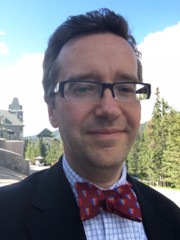Medicine care team
Neurology

Neurology division
Sunnybrook Health Sciences Centre
2075 Bayview Ave., A-wing, 4th floor, room 42
Toronto, ON
M4N 3M5
Education:
- MD, 1995, faculty of medicine, University of Toronto, Canada
- FRCPC, 2000, neurology, Harvard University, U.S.
- D,ABSM, 2002, sleep medicine, Harvard University, U.S.
Appointments and Affiliations:
- Affiliate scientist, Evaluative Clinical Sciences, Hurvitz Brain Sciences Research Program, Sunnybrook Research Institute
- Associate professor, department of medicine, U of T
- Chair, Royal College of Physicians of Canada Specialty Committee in Neurology
- Chair, Research Ethics Board, Sunnybrook Health Sciences Centre
- Head, division of neurology, Sunnybrook
Research Focus:
- Neurology of sleep
Research Summary:
Dr. Murray's major research interests are in neurological aspects of sleep and the relationship between sleep and behaviour. Some clinical conditions of particular interest include narcolepsy, rapid eye movement sleep behaviour disorder, restless legs syndrome and the effects of sleep and sleep disorders in other medical conditions.
Polysomnography (sleep studies) and actigraphy are two commonly used tools in his lab. Polysomnography is a powerful tool that can be used to study, objectively, the physiological effects of various treatment interventions in multiple medical conditions. Similarly, treatment of sleep disorders can often have significant impact on patient health from a variety of perspectives. Dr. Murray's team performs overnight sleep studies and tests daytime alertness while recording various physiological parameters.
Dr. Murray is particularly interested in the cortical plasticity of rehabilitation. Sleep and sleepiness act as models for cortical plasticity given the dramatic physiologic and chemical changes that occur in the brain every night. His team has created a state-of-the-art sleep laboratory at Sunnybrook, with full polysomnographic monitoring, extended EEG, video monitoring, psychomotor vigilance assessment, actigraphy and portable equipment for in-home use. They have also set up a facility to draw blood samples (including genetic studies) from patients overnight and to administer medications without disturbing sleep, while simultaneously making polysomnographic recordings. All data collected from clinical research assessments are stored digitally for advanced signal analysis.
His team is also developing tools for the early diagnosis of neuropsychiatric disorders and for the endophenotyping of various conditions. Their premise is that during sleep the brain is relatively isolated from its environment and therefore more "objective" with various physiologic parameters, reflecting a baseline level of neurochemical activity.
Selected Publications:
See current publications list at PubMed.
- Govindarajan A, Urbach DR, Kumar M, Li Q, Murray BJ, Juurlink D, Kennedy E, Gagliardi A, Sutradhar R, Baxter NN. Outcomes of daytime elective procedures performed by physicians after providing overnight medical services. N Engl J Med. 2015 Aug;373(9):845–53.
- Moszczynski A, Murray BJ. Neurobiological aspects of sleep physiology. Neurol Clin. 2012 Nov;30(4):963–85.
- Coelho FM, Georgsson H, Murray BJ. Benefit of repeat multiple sleep latency testing in confirming a possible narcolepsy diagnosis. J Clin Neurophysiol. 2011 Aug;28(4):412–4.
- Coelho FMS, Georgsson H, Narayansingh M, Swartz RH, Murray BJ. Higher prevalence of periodic limb movements of sleep in patients with history of stroke. J Clin Sleep Med. 2010 Oct;6(5):428–30.
- Lim AS, Moro E, Lozano AM, Hamani C, Dostrovsky JO, Hutchison WD, Lang, Richard AE, Wennberg A, Murray BJ. Selective enhancement of REM sleep by deep brain stimulation of the human pons. Ann Neurol. 2009 Jul;66:110–114.
Related News and Stories:
- Scientists stimulate dreaming sleep: Sunnybrook sleep researchers are the first in the world to nearly double dreaming sleep with brain stimulation (Sept. 10, 2009)
- Brain waves of dreaming sleep found for first time (July 4, 2007)


